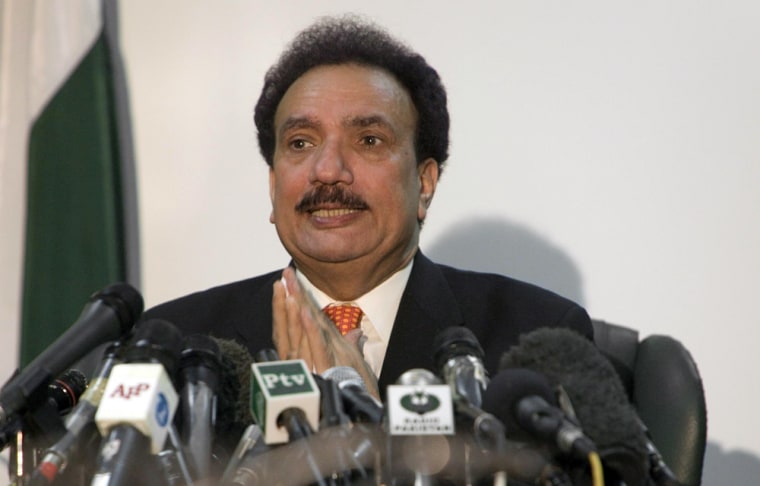Pakistan acknowledged the Mumbai attacks were partly plotted on its soil and announced criminal proceedings against eight suspects, including three alleged ringleaders, in a sign it is heeding U.S. and Indian demands to punish those responsible for the deaths of 164 people.
India called Thursday's announcement a "positive development" and the news was welcomed by Washington, which had feared tensions the attacks triggered between the nuclear-armed neighbors would distract Pakistan from its struggle against the Taliban and al-Qaida.
"I want to assure the international community, I want to assure all those who have been victims of terrorism, that we mean business," Interior Ministry chief Rehman Malik said at a news conference, while holding up a copy of the findings that were later handed over to India.
Analysts said the admission of a link to its citizens meant Pakistan was no longer "in denial," but noted the U.S. and India would still push for convictions against the plotters and look for evidence that Islamabad had dismantled anti-India militant groups it once cultivated as proxy armies against its giant neighbor.
India and Pakistan have fought three wars since 1947, creating a poisonous legacy that meant it was difficult for Pakistan's shaky civilian government to acknowledge Indian, U.S. and British allegations that its citizens were involved in the attacks without looking like it was caving in to its old foe.
New Delhi says the 10 gunmen — only one of whom was captured alive — were Pakistanis and that their handlers in Pakistan kept in touch with them by phone during the three-day assault on 10 sites including two five-star hotels and a Jewish center.
Pakistani agents involved?
Indian officials have also accused Pakistani intelligence agents of involvement in the attacks — a charge denied by Islamabad, which had been working to improve ties with New Delhi before the strikes.
Malik said Pakistani investigators had determined three boats were used by the attackers to sail from southern Pakistan to India. He said investigators had busted two hide-outs of the suspects.
He said other leads pointed to Europe and the United States and Pakistan would ask the FBI for help.
Detectives traced an engine recovered from one of the boats to a shop in the southern Pakistani port city of Karachi. Malik said the shopkeeper provided the phone number of the buyer, which led to a bank account in the name of Hammad Amin Sadiq.
Malik said authorities arrested Sadiq and obtained from him information that led them to two "hide-outs of the terrorists," one in Karachi and one about two hours drive away. He described Sadiq as "the main operator," but didn't elaborate.
"Some part of the conspiracy has taken place in Pakistan and ... according to the available information, most of them (the suspects) are in our custody," he said, without saying where else the attacks could have been planned.
One suspect, Javed Iqbal, had been "lured" back from Barcelona, Spain, where he had been living, and was now in Pakistani custody. While in Spain, Iqbal had arranged Internet telephone accounts used in the attacks and bills had been paid in Italy, Malik said.
India has blamed the attack on Lashkar-e-Taiba, an Islamist militant group widely believed created by Pakistani intelligence agencies in the 1980s to fight India rule in the divided Kashmir region, the trigger for two of the wars between the countries.
Ring leaders arrested
Pakistani officials have already said they arrested two alleged leaders of the group, Zaki-ur-Rehman Lakhvi and Zarrar Shah, who have been publicly accused by India of masterminding the attacks. Malik said criminal cases had been registered against those four men and four other suspects — all Pakistani citizens — on charges of "abetting, conspiracy and facilitation" of a terrorist act. It was not immediately clear when they would be presented in court.
Malik reiterated Pakistani requests that India provide more evidence to help secure a conviction.
"Let us work for it together because we want these culprits to be brought to justice," he said.
Malik said Pakistan was sending 30 questions to India about the attacks. Among the additional information sought are the fingerprints of the 10 gunmen, the DNA of the lone survivor and details of intercepted phone conversations between the militants and their handlers.
In a statement, India's Foreign Ministry said it would examine Pakistan's investigation report and "share whatever we can" with authorities there.
Malik said the suspects also used a digital teleconferencing system whose service provider is based in Houston, Texas, while a satellite phone used by the attackers was issued in a "Middle Eastern country," he said, giving no more details.
U.S. State Department spokesman Robert Wood said the arrests showed "Pakistan is serious about doing what it can to deal with the people who may have perpetrated these attacks."
Ahmed Rashid, the author of a book about Pakistan called "Descent in Chaos," said Thursday's announcement represented "a marked difference from the state of denial we have been in for the last two months."
"We seem to have broken the logjam," he said. "The key question now is whether groups like Lashkar are dismantled."
More on India | Pakistan | Lashkar-e-Taiba
